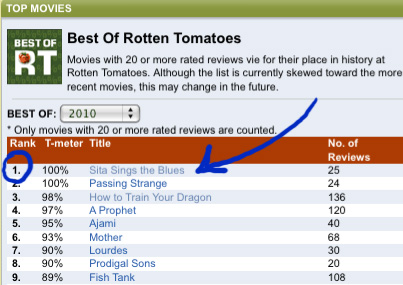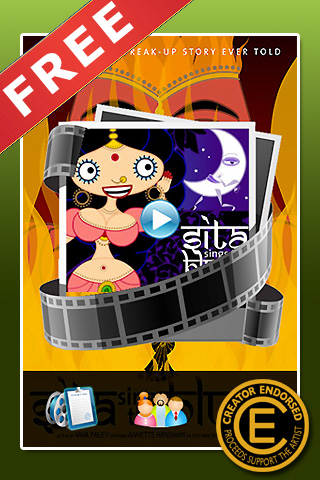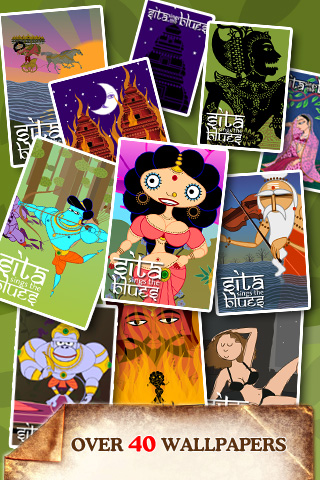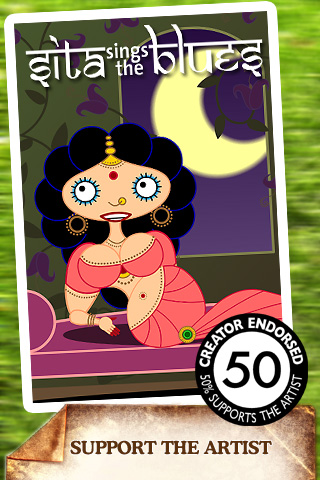At last, our “official” version of Copying Is Not Theft, with a fab new arrangement by Nik Phelps!
Category: Free Culture
Sita #1 rated film on Rotten Tomatoes
Sita Sings the Blues is Rotten Tomatoes’ best-reviewed film of the year. Today, anyway. To preserve this precious moment, I took a screen shot.
The Vegetarian at the Butchers’ Seminar
Yesterday I attended a film conference. I found myself at a talk in which filmmakers were advised how to negotiate deals.
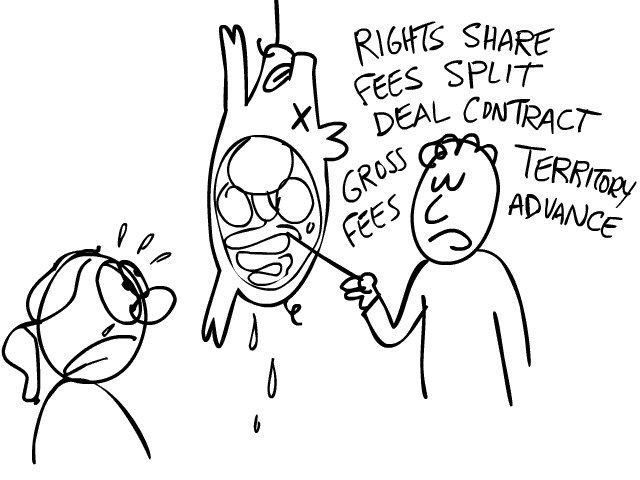
I felt sick listening, and wondered why. Monopolies were an unquestioned, underlying assumption. When the time came for audience comments and questions, I said that rights were monopolies, that monopolies prevent the market from functioning, that distributors can be great if they’re not granted monopolies, and that it’s up to us artists to not grant those monopolies in the first place.
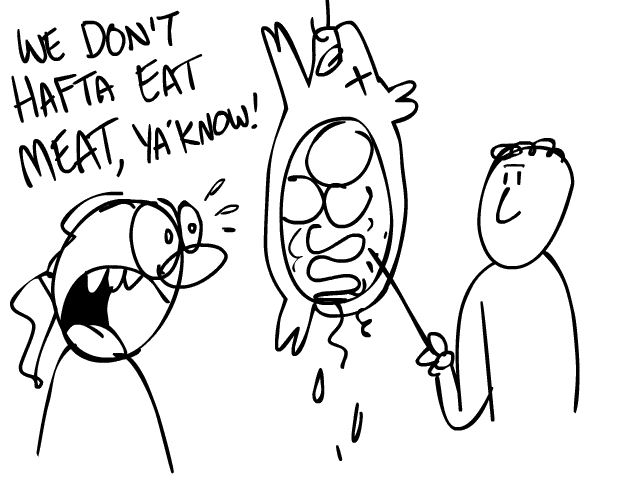
Naturally, the speaker wasn’t too thrilled with my comment.
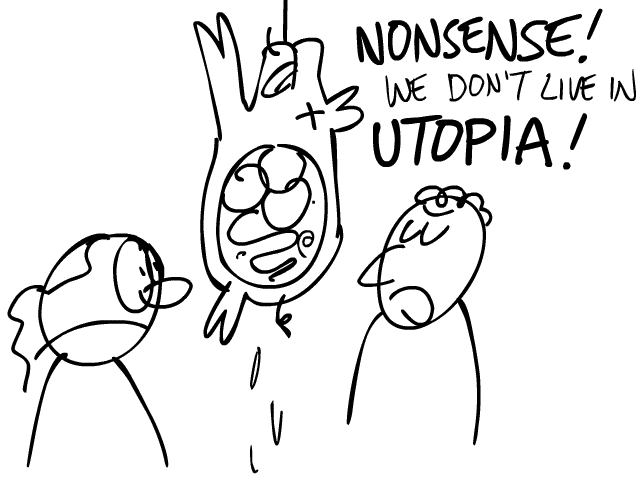
If filmmakers realized monopolies don’t serve them, he’d be out of a job (he’s one of the many professionals who “help” artists by “protecting” them). Later, I came up with a metaphor (or meat-aphor) that helped explain my feelings: being a Free Culture advocate at a film conference is like being a vegetarian at a butchers’ seminar.
As a vegetarian I’ve learned better than to discuss dietary habits with the many carnivores who are my friends and loved ones. So I’m questioning what I’m doing at these conferences. I wouldn’t walk into a butchers’ conference and advocate vegetarianism. But what would I do if I were invited, because some of the butchers wanted to learn about vegetarianism, if only to marvel at its freakishness?
Mimi & Eunice
Many years ago, I thought “Mimi & Eunice” would be a great name for a comic strip. Recently I’ve been needing to do some drawing just to keep my head from exploding, so this week I figured, why not Mimi & Eunice?
As far as I can tell, Mimi & Eunice are two middle-aged children/baby psychos/heterosexual lesbians. That’s all I can surmise so far.  I didn’t put my name on these comics, but I did tag them with the URL mimiandeunice.com. (Unfortunately that site is a mess right now. Webmaster Ian installed the comicpress theme in wordpress, but it’s squishing the strips horizontally unless I make them really tiny. Also, even though it lets me bulk upload media, it doesn’t let me bulk post.
I didn’t put my name on these comics, but I did tag them with the URL mimiandeunice.com. (Unfortunately that site is a mess right now. Webmaster Ian installed the comicpress theme in wordpress, but it’s squishing the strips horizontally unless I make them really tiny. Also, even though it lets me bulk upload media, it doesn’t let me bulk post.
 So I’m just posting a bunch of them here, for now. If anyone out there makes great comics web sites and wants to make one Mimi & Eunice, please get in touch!)
So I’m just posting a bunch of them here, for now. If anyone out there makes great comics web sites and wants to make one Mimi & Eunice, please get in touch!)
 Other than getting mimiandeunice.com functional and pretty, I need to decide which license to release them under, or whether to use a license at all. So far copyleft, as embodied in the Creative Commons Share Alike license, has served my work very well. But maybe I should go for Public Domain instead?
Other than getting mimiandeunice.com functional and pretty, I need to decide which license to release them under, or whether to use a license at all. So far copyleft, as embodied in the Creative Commons Share Alike license, has served my work very well. But maybe I should go for Public Domain instead?
If I use a license, it’ll be one of the 3 Free licenses Creative Commons offers:
CC-BY-SA (copyleft)
CC-BY (attribution)
CC-0 (Public Domain)
The advantage of copyleft is it ensures the work stays Free. Any derivatives must be released under the same terms, so no one can lock it up. It prevents abusive exploitation; no one can monopolize it. The drawback is that keeps it from being used in some projects that use more restrictive licenses. As nasty as restrictive licenses are, they’re still very common, and many worthy projects use them. You can still use a copyleft work within a larger copyrighted work as “Fair Use,” but few are willing to take that risk.
CC-BY (attribution) is compatible with both copyleft and copyright projects, which could conceivably allow the works to spread further. But it still relies on the threat of legal force to ensure attribution. As I wrote recently, attribution has limits that the law might not recognize. Also, I’m intrigued by avoiding legal enforcement as much as possible, and relying on social mores and community ethics to ensure attribution. In fact I already do this with Sita Sings the Blues, but if I want to sue someone for plagiarism or improper attribution, I can. Is that threat really necessary?
Sometimes I think CC-0 (Public Domain) is the most spiritually advanced license. No legal claim to attribution. No legal claim to anything. To put a work in the Public Domain is to totally let it go. That is a turn-on.
Unfortunately many useful Public Domain works are snatched right out of the Public Domain via copyrighted “derivative works”. Take the comic above. If you changed the background color on panel 3 from reddish-gray to lime green, you could say you’ve made a new work and copyright the result. I don’t mind modifications like changing colors, in fact I encourage them; but I abhor monopolies, and the thought of someone then locking up the work in this way is troubling. Certainly the source would remain in the Public Domain. But if someone else modified the source in a similar way, being likewise inspired to change the color of panel 3 to lime green, they could be sued by the jackass that copyrighted his lime-green-panel-3’ed version.
Lewis Carroll’s Alice in Wonderland is in the Public Domain, and technically you can still build on it. But if your “derivative work” too closely resembles Disney’s, they will sue your ass. The laws don’t recognize parallel evolution, nor do the tiny shriveled minds of the corporate executives who wrote them. Thus, although the exact text of Carroll’s original Alice in Wonderland is PD, it’s no longer “free” to build on thanks to corporate monopolies on derivative works.
Much as I want to let go entirely, I fear that could be socially irresponsible. Which also why using no license at all is not really an option. In our world, everything is copyrighted, whether it displays the © symbol or not, whether it’s registered or not, whether it’s attributed or not. Everything is “owned” by someone. Therefore unless something is very clearly marked as Free, it is assumed to be Owned. No license at all would make it impossible for would-be re-users to determine whether the work is legally safe to use.
A friend pointed out that the State gets into everything. Just because I don’t invoke repressive copy restrictions directly, doesn’t mean they don’t affect my work indirectly. Copyright affects everything, whether it’s copyrighted or not. Art is born free, but is everywhere in chains.
Another friend pointed out that my desire to “let go” is still desire. Choosing CC-o/Public Domain to experience the thrill of “selflessness” may actually be more selfish than choosing strong copyleft.
I want my art to stay free. How to achieve that under our current copyright regime, is quite a dilemma.
Forever Frunch
Every Friday, 2 pm, Soy & Sake @ 47 7th Ave S (at Commerce St) in New York’s West Village. Open to anyone who is into Free Culture, Free Software, Free Speech, Intellectual Freedom, anti-censorship, etc.
YES we do this every week. Good times!
Sita now a FREE iPhone app!
Hooray! The complete Sita Sings the Blues movie is now available FREE for the iPhone, rather than for $3.99. The former price was required because for every copy of Sita “sold,” I had to pay almost $2 to extortionate corporate licensors. That’s a flat fee; doesn’t matter what the sale price is. So selling Sita apps for the customary $.99 would result in a huge loss for me, since I’d be paying far more than that to the licensors.
The solution of course was to make it FREE. They’re all Promotional Copies. No sale, no license fee. To support Mars Yau, who created the app, and me, who created the movie, you can buy the Sita Wallpaper App for $.99. And of course you can always donate to the Sita Distribution Project.
If you have an iPhone please rate the app highly (5 stars? if that doesn’t violate your conscience) to help it spread.

